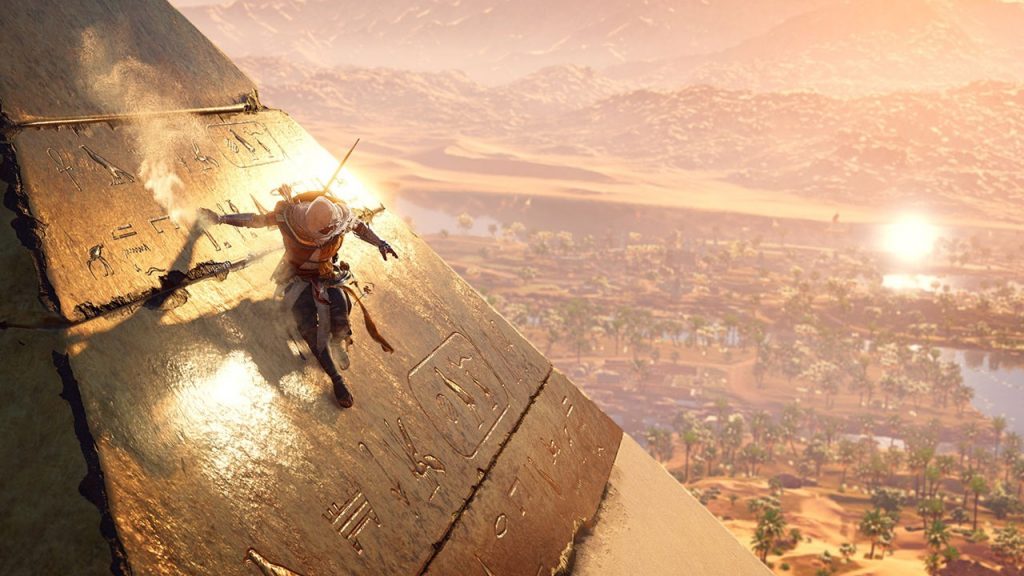The Assassin’s Creed series has taken something of a hiatus after AC: Syndicate, but it’s coming back swinging a year later. New setting, new mechanics, new protagonists, new paradigms.
There’s a lot to unpack even based on trailers alone, so let’s see what we know so far about Assassin’s Creed: Origins.
Combat, combat finally changes
Let’s be honest here: no matter how many enemies the previous AC games would throw at us one by one the combat was still little more than waiting for a strike to counter, because actually attacking was less effective.
Origins throws all of that to the trash can, and brings something new.
New combat ditches the pre-set aligning animations of previous entries in favour of something more dynamic, and based more on hitboxes than matching animations. Add to it fast and heavy attacks, a shields you can use to parry, and more dynamic dodges and suddenly it turns out that Bayek, the protagonist, can control the battlefield much more than his illustrious successors in the second millennium AD ever did.
A very pleasing change also happened to ranged weapons, which stopped working on a lock-on basis, now giving you a proper reticule and, as seen in one of the gameplay videos, the ability to actually shoot people mid-leap or mid-combat. Dropping the auto-targeting also means that you’ll be able to actually target different parts of your enemies’ bodies for different effects.
Although it remains to be seen how it works in practice, the change from choreographed sequences and QTE-like counters/attacks is very welcome and very likely more engaging.
Oh, and there are going to be boss fights, hopefully nothing like the one against the pope.
New setting
We’ve travelled quite a bit of history across all the Assassin’s Creed games. Ranging from the crusades, in the time of Altair, to Victorian London defended endearingly by the Frye twins. It clearly got hard to find a good place to parkour in the nascent twentieth century, so Ubisoft decided to go in the other direction. As a result Assassin’s Creed: Origins takes place in the ancient Egypt, more specifically it’s last days of ca. 50 BC. Julius Caesar, Cleopatra, all that political and cultural turbulence.
Putting the action in this timeframe also means that the Assassin-Templar conflict we know of doesn’t even come into place yet, because neither organisation exists per se.
The new protagonist, Bayek, has the trapping of an assassin, including the iconic hood, a literal eagle vision, and clearly a penchant for being involved in political machinations, but he isn’t an assassin. He is a medjay, which in the times closest to the game event meant an elite armed force – scouts and protectors of pharaohs’ lives and interests.
Go wherever, do whatever
In design the world and missions of AC: Origins it appears that Ubisoft has taken notes from The Witcher 3, because it certainly has some of the features recently best exemplified by CD Projekt Red’s hit.
First of all, the AC: Origins gameplay isn’t going to make you stuck in a mission until it is either resolved in some way, or abandoned, like previous Assassins did. Now you’re getting proper quests, and reportedly you’ll be able to ignore them and go exploring to return when you feel like it.
The exploration itself is also going to be improved, with most of the world available from the get-go. Nothing is going to stop you from roaming the world, taking in the sights of two large cities (Memphis, Alexandria), Bayek home village Siwa, or just the places in-between. The map (singular, not plural) is also going to be full of life, with competing faction interacting without your prompts, people going about their agendas and routines. It’s a verisimilitude typically left for RPGs, but it’s nice to see that AC will have more of that particular feature.
The quests themselves are going to be worthwhile, including some Witcher-like investigations and mini narratives providing context and motivation for Bayek to be involved in the first place. Reportedly there’s going to be little difference in quality between main and side quests.
Loot and progression
In a surprising turn of events, AC: Origins turned out to have a loot system in place of the rather static arsenal we know from previous games. Bayek’s going to find a variety of equipment during his exploration and missions, and picking the right tools for the job is going to have more importance. For instance going with a sword against a guy in armour is not going to be a good idea.
There’s also going to be actual progression, similar to the one known from AC: Syndicate. Throughout the game Bayek will be able to unlock abilities from three skill trees: Hunter, Warrior, and Seer. Hunters favour the bow and make better use of Bayek’s eagle (drone) Senu. Warriors are, well, fighters. Seers on the other hand enjoy tricks and gadgets.
Soft reboot?
Over all it seems that Assassin’s Creed: Origins could be styled as a soft reboot of the franchise, if not plot-wise, then certainly in terms of mechanics and paradigms, which is just as good. Between the revamped world structure, combat reworked from he ground up, introduction of loot and worthwhile progression Assassin’s Creed: Origins, launching on October 27, may turn out to be a hit and a breakthrough the franchise sorely needed after a decade.
Are you going to take a trip back in time and see the pyramids back when they weren’t all plundered?
This post didnt have a specific author and was published by PS4 Home.

